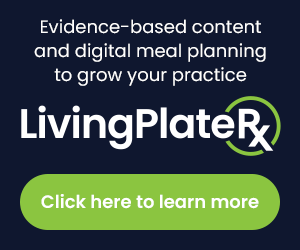|
E-Newsletter • March 2025 |
▼ ADVERTISEMENT

|
Editor's E-Note
Labeling and Quality Assurance
Dietary supplements, food products, water systems, and other items may often carry labels indicating some degree of third-party quality assurance certification. Dietitians may have questions about what some of the more commonly sighted certifications entail and what they may or may not include. In this month’s E-News Exclusive, we focus on one of the most prevalent and widely recognized third-party certifications, NSF. Learn about their testing facilities, protocols and methods, regulatory compliance verification and consulting services, and the broad impact they have across numerous sectors and interests, including some that might surprise you, such as those relating to sustainability.
After reading the article, visit TD’s website at www.TodaysDietitian.com to read the digital edition of our March issue. There you can enjoy an exciting lineup of featured stories, including a clinically focused exploration of the role of micronutrients in the ICU, our annual TD10 tribute celebrating remarkable RDs, a tour of the world of antioxidant science through the lens of endogenous antioxidants, and the first of our 2025 Great Debates features—this one focused on ultraprocessed food. You’ll also discover the first release of our new regular dietitian-driven Trend Watch column, with each edition providing an insider’s peek into one of the hottest food and nutrition trends of the year and showcasing popular food and beverage products with more than a few culinary prompts to inspire your taste buds.
Please enjoy the E-Newsletter and give us your feedback at TDeditor@gvpub.com. Don’t forget to like us on Facebook and follow us on X, formerly known as Twitter.
— Heather Davis, MS, RDN, LDN, editor |
|
|
| In This E-Newsletter
|
|
 |
|
|
▼ ADVERTISEMENT

All About NSF: Supplement Certification and Beyond
By Heather Davis, MS, RDN, LDN
Many dietitians may be familiar with dietary supplements or other food and health products stamped by one of NSF’s labels or certification marks. What does an NSF certification entail? What should dietitians know about what NSF certification conveys to consumers? RDs may also find themselves involved in leveraging tools and other services and certifications provided by NSF to clients through directly or indirectly participating in the many food systems, institutions, and other regulatory bodies collaborating with NSF.
▼ ADVERTISEMENT

NSF, formerly known as the National Sanitation Foundation, has been around for quite some time, emerging in 1944 to help provide independent quality assurance for a plethora of products. For RDs, perhaps most well-known is the role NSF plays in assuring quality and compliance in various dietary supplements or certain food products; however, the reach of NSF extends far beyond this realm. NSF is a World Health Organization Collaborating Center on Food Safety, Water Quality, and Medical Device Safety. Expanding through the years to encompass a wide range of services relating to quality assurance, you can now find NSF offering the following:
- food safety training, auditing, customized assurance, certification, research and development, and practical guidance to businesses;
- supply chain management, including protecting against food fraud, mislabeling, improving regulatory compliance, and sustainability consulting;
- audits and certification standards for animal wellness and welfare, including seafood-related aquaculture sectors;
- audits and certification standards for ethical trading and working conditions;
- sustainability claim verification, life cycle assessments, and reporting;
- certification for products and facilities in nutritional, cosmetics, personal care, and over-the-counter product industries;
- life science consulting in pharmaceutical, biotech, and medical device sectors to help companies bring products to market and maintain compliance and quality;
- regulatory guidance;
- management system certifications;
- quality, performance, and safety testing for water products and systems as well as conducting system design; and
- transport supplier certifications and compliance.
|
Study Finds Physical Activity Reduces Chronic Disease Risk
University of Iowa researchers are recommending that all patients be surveyed about their physical activity levels after a new study underscores the link between physical activity and chronic disease.
The study, led by Lucas Carr, PhD, an associate professor in the department of health and human physiology, examined responses from more than 7,000 patients at University of Iowa Health Care Medical Center who noted their level of physical activity in a questionnaire.
From patients’ answers to the questionnaire, the researchers found that those who reported the highest level of physical activity—meaning they exercised moderately to vigorously at least 150 minutes per week—were at a statistically significantly lower risk of having 19 chronic conditions, including CVD, cancer, respiratory disease, and diabetes.
The findings further suggest that patients who are least active—meaning they reported little to no exercise in a given week—are at increased risk of developing a chronic disease.
Based on those results, the Iowa researchers also recommend that health care systems provide information on health and wellness services for physically inactive patients who are at most risk.
|
FDA Bans Red Dye 3 in Foods
The FDA has announced a ban on Red Dye No. 3 (erythrosine) in foods and ingested drugs due to its association with cancer in male laboratory rats, reports The New York Times. The ban will be enforced starting January 2027 for foods and January 2028 for drugs. This decision aligns with earlier restrictions on the dye in cosmetics and responds to long-standing health concerns.
New Recommendations to Measure Obesity Go Beyond BMI
A global commission of over 50 experts recommends redefining obesity assessment beyond BMI, citing its limitations in distinguishing between muscle and fat, reports CBS News. They propose evaluating body fat distribution and its impact on organ function and daily life. The commission suggests two new categories: clinical obesity, where excess fat impairs health, and preclinical obesity, indicating increased risk without immediate health issues. This approach aims to improve diagnosis and treatment strategies. |
CPE Monthly
Learn about the health claims and considerations associated with apple cider vinegar and strategies dietitians can use to help clients decide whether incorporating the vinegar into their diets is appropriate, safe, and effective in this month’s issue of Today’s Dietitian. Read the CPE Monthly article, take the 10-question online test at CE.TodaysDietitian.com/CPEmonthly, and earn two CPEUs!
2025 Spring Symposium
We’re less than 2 months away from the Today’s Dietitian Spring Symposium in San Antonio. Finalize your plans now to join your colleagues for this one-of-a-kind educational event. We hope to see you in San Antonio!
|
Encouraging Clients’ Health Journeys
ABC Trainerize is an app designed for health professionals, including RDs, to streamline client engagement. The service allows RDs to create customized meal plans, monitor client progress, and integrate nutrition guidance with fitness programs. The platform allows for in-app messaging, goal tracking, and habit coaching to help encourage client accountability. ABC Trainerize is available on iOS and Android.
Peer-to-Peer Connection
RD Link is a networking app for RDs seeking professional growth and resources. It helps connect dietitians with peers, job opportunities, and continuing education options. In addition, it offers discussion forums, expert webinars, and research updates to help users stay informed. Learn more at their website. |
In the April Issue
• Rethinking Polycystic Kidney Disease
• Myasthenia Gravis
• Nutrition for PANS & PANDAS |
|
|
COVER STORY
Micronutrients in the ICU
Micronutrient imbalances are common in critically ill ICU patients, complicating the clinical picture. Revisit common challenges in micronutrient assessment and intervention and see what the latest research can add to your toolset.
FEATURE
TD10
In Today’s Dietitian’s 16th annual showcase of dedicated and deserving dietitians, this year’s winners display incredible achievements that are making huge impacts in dietetics and their own communities.
|
|
|
| Advertising Opportunities |
Have a product or service you want to market to nutrition professionals? Utilize the reach of Today’s Dietitian Magazine to accomplish your marketing goals. E-mail our experienced account executives today at sales@gvpub.com or call 800-278-4400 for more information.
|
| © 2025 Today’s Dietitian Magazine |
|
|